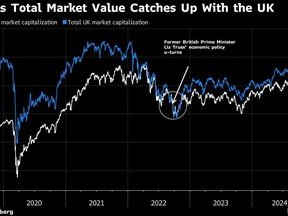The UK stock market is falling behind Canada in value of listed companies, dealing yet another blow to London’s meandering equity market, which has been eclipsed by ascending exchanges like India in recent years.

Article content
The U.K. stock market is falling behind Canada in value of listed companies, dealing yet another blow to London’s meandering equity market, which has been eclipsed by ascending exchanges like India in recent years.
Market values in Canada have surged 11 per cent so far this year to US$3.22 trillion, according to data compiled by Bloomberg. The value of firms on the Toronto Stock Exchange and the broader Canadian equity market is now neck and neck with the United Kingdom. The data exclude foreign depositary receipts and exchange-traded funds in both markets.
Advertisement 2
Article content
The move took the United Kingdom to seventh place on a list of global stock markets by value, behind the United States, China, Japan, Hong Kong and India, which surpassed the United Kingdom in 2021. Paris also overtook the London market in 2022, but political turmoil in France allowed the United Kingdom to reclaim its spot as the largest equity market in Europe earlier this year.
For its part, Canada’s stock market briefly surpassed the United Kingdom in September, 2022, during the market chaos of former British prime minister Liz Truss’s government, but this time it looks like it could stick. The two have been moving in opposite directions over the past decade, with Canadian exchanges adding US$1 trillion in aggregate market capitalization, while the United Kingdom lost nearly as much. Strategists and investors expect capital to flow into Canadian shares over U.K. stocks in the future.
The U.K. equity market’s lost ground partly stems from its heavy weighting in low-growth industries like consumer staples and pharmaceuticals. And while the bulk of the U.K. market is made up of global companies, the more-domestic stocks have been hit by a series of own-goals, including Brexit in 2016 and often rapid-fire leadership changes at 10 Downing Street.
Article content
Advertisement 3
Article content
Toronto, meanwhile, is more heavily weighted toward cyclicals, which have all surged and led the benchmark S&P/TSX Composite to 29 record highs this year as the Bank of Canada led the Group of Seven economies in embarking on three rate cuts. A relatively larger weighting of high-growth tech companies, thanks in large part to Shopify Inc. and Constellation Software Inc., has helped Canada, too.
“Canada is a market that is still growing and still has opportunity and it puts a brighter spotlight on Canada as an investment opportunity,” said Philip Petursson, chief investment strategist at IGM Financial. He added that passive investing flows can also make the trend a “a self-fulfilling prophecy” for investors following world indexes.
Right now, there are 85 Canadian stocks on the MSCI World Index, amounting to a 3.2 per cent weighting, compared with 75 stocks and a 3.6 per cent weighting for the United Kingdom.
Of course, equity-market capitalization aside, Toronto is still a long way from overtaking London as a financial hub. London is ranked second only to New York on the Global Financial Centres Index, well ahead of Toronto, which is ranked 23rd. Moreover, 11 per cent of the world’s assets are managed in the United Kingdom, second only to the United States, according to the Investment Association.
Advertisement 4
Article content
The London Stock Exchange declined to comment, but provided their own data suggesting the total market value of London firms exceeded that of Canada.
International presence of TSX
The Toronto Stock Exchange has a presence in multiple foreign markets that are helping to drive its growth, chief executive officer Loui Anastasopoulos said in an interview. “We probably have the most-global business development team of any other exchange,” he said. The firm has business development staff in the United Kingdom, Australia, Brazil, Israel and multiple U.S. cities.
The strategy has helped the exchange to grow despite a historic dry spell of initial public offerings. There have been no IPOs in Canada since 2022, but the TSX brought 51 new companies to the Toronto Stock Exchange since that time by plucking them out of competing markets.
London’s reputation as a listing venue for global firms has suffered several blows in recent years. British chipmaker ARM Holdings Plc opted to go public in New York, while firms including Flutter Entertainment Plc and Indivior Plc have chosen to switch their main share listings to the United States.
Advertisement 5
Article content
Still, optimism is growing around a revival in IPOs. Fast-fashion giant Shein confidentially filed papers with U.K. authorities in June for a potential London IPO, according to people familiar with the matter, in what would be a huge listing.
United Kingdom’s tech challenge
One major challenge for the U.K. market has been the size of its information technology sector, which occupies just a 1 per cent weighting on the FTSE 100 Index.
Tech companies now occupy an 8.4 per cent weighting in Canada, up from a paltry 2 per cent a decade ago, to place the country ahead of the Untied Kingdom, but still well shy of the massive 30 per cent weighting on the S&P 500 Index.
“It’s not like Canada has been shooting the lights out on productivity or innovation or pro-growth business climate either, but the U.K. has been really dreadful,” said Brian Madden, chief investment officer at First Avenue Investment Counsel, noting that Canada has posted better performance relative to the United Kingdom since Brexit.
Article content

